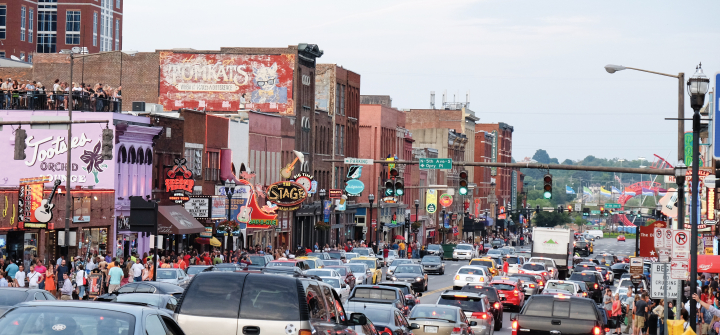Transportation Justice in Music City
NASHVILLE, Tenn.—In spectacles, pinstriped pants, and a yellow tie, at a brewery a half mile from Interstate 65, Nashville Mayor Freddie O’Connell is talking to a group of locals about transportation. When we “do better on transit,” he says on a September evening, we get multiple important outcomes: Public health, the environment, small businesses, and residents’ finances improve; and streets and roadways are safer.
Music City needs help on those fronts. It has the toughest commute in the U.S., due to long drive times and lack of walkability, bikeability, and public transportation, according to a Forbes analysis. With 86 people moving to the booming city every day, time spent in traffic congestion increased to 56 hours in 2023 from 41 hours in 2022.
Pollution from traffic snaking through the city’s urban core disproportionately impacts historically marginalized communities, exposing residents to high concentrations of airborne toxins.
Most of the city’s major roads and highways run through neighborhoods that mortgage lenders deemed “hazardous” for loans in the mid-20th century because of concentrated populations of racial and ethnic minorities—a racist practice called redlining. In Nashville neighborhoods and cities across the U.S., mortgages and small business loans were denied. Communities were severed by freeways. Public greenspaces were absent or neglected, and health outcomes deteriorated.
O’Connell, who lives in one of those neighborhoods, is on a mission to “reverse the effects of environmental racism.” His engine of choice: transportation infrastructure.
Outdoor air pollution is a well-documented threat to human health—the WHO estimates it is responsible for 4.2 million deaths globally each year. Causes include heart disease, stroke, chronic obstructive pulmonary disease, and lung cancer. Pollution also increases risks for childhood asthma and premature births, says Tina Hartert, MD, director of the Center for Asthma and Environmental Sciences Research at Vanderbilt University Medical Center.
People living within 300 to 500 meters of heavily trafficked roads are at highest risk of negative health outcomes, and a 2024 study of more than 20,000 people showed that close proximity to highways can increase depression and anxiety, according to the Journal of Affective Disorders. Low-income neighborhoods contribute the least to the city’s carbon footprint, says Hartert, but they are most affected by it.
Underserved neighborhoods are also less likely to have access to healthy food, safe places to exercise, and medical care, says Mark Yancy, CEO of the nonprofit NashvilleHealth. Without transportation, resources that could benefit residents are often out of reach, he adds.

Nashville is prioritizing greenspaces, which can improve air quality and lower temperatures in the city. Sarah Hays Coomer
O’Connell, who became Nashville’s mayor in 2023, wants to establish economic equity and reduce pollution-related health threats through a combination of cutting-edge technology and natural resources. As a city councilperson in 2019, he embarked on this mission by spearheading unanimous passage of three bills transitioning the Metro Nashville government to 100% renewable energy, including plans for an all-electric vehicle fleet and updated green building standards, such as rooftop solar panels, water conservation, and geothermal heating and cooling systems.
But, without funding, progress is incremental. Nashville is one of four out of 50 major metropolitan areas in the U.S. that have not accepted federal funds from the Bipartisan Infrastructure Law and Inflation Reduction Act. To claim it, voters must approve a referendum in November establishing matching funds for transportation through a temporary 0.5% surcharge on sales tax.
If the referendum is approved, O’Connell aims to replace two-thirds of the city’s traffic lights with smart signals capable of adjusting traffic flows on demand while reducing commute times and stop-and-go fuel emissions. The initiative would also construct bike lanes, 86 miles of new sidewalks, and 12 new transit centers with 24-hour bus service, allowing riders to bypass an “antiquated hub-and-spoke model” that required all routes to intersect downtown, he says.
The first center opened in North Nashville in September 2024. Air conditioned, with floor-to-ceiling windows, the site celebrates the neighborhood’s residents and history, memorializing key figures in Nashville’s civil rights movement and capturing reflections from local youth in a mural surrounding a sunlit picnic area. Eight new routes give riders direct access to more jobs, health care, education, and recreation without navigating downtown gridlock.
Along sidewalks and public spaces, the city has committed to planting 500,000 trees by 2050 and seeding native wildflowers citywide. Greenspaces help mitigate greenhouse gas emissions, improve air and water quality, lower temperatures in urban areas, and improve storm water management, says Kendra Abkowitz, the city’s senior director of Sustainability and Resilience.
Getting public buy-in for an investment like that can be challenging, says Abkowitz, especially when people are concerned about pressing issues such as affordable housing, community safety, and education, she says. “Sustainability and resilience measures do have cost savings, but they are always competing with other priorities without enough resources,” she adds.
To support the city’s efforts, in March 2024, Nashville was named one of 25 Bloomberg American Sustainable Cities, a three-year initiative to “turbocharge” climate action through infrastructure and economic growth.
When he was in his 20s, O’Connell decided he would rather pay down student loans and save for a house than go into debt for a car. Learning to use transit and connecting with other riders shaped his policy agenda. “I’ve been surrounded by people whose lived experience has been materially improved by access to transit,” he says. “It helps us reclaim first minutes, then hours, then days and weeks of our lives to do things we love with people we love.”
Sarah Hays Coomer is a Mayo Clinic- and National Board-certified health coach, Forbes Health columnist, freelance journalist, National Strength and Conditioning Association certified personal trainer, speaker, and author.
Join the 50,000+ subscribers in 170+ countries who rely on Global Health NOW summaries and exclusive articles for the latest public health news. Sign up for our free weekday newsletter, and please share with friends and colleagues.
Many of the historic buildings, shops, bars, and clubs along Broadway in Nashville, Tennessee. Cheryl A. Austin/Wikimedia Commons




